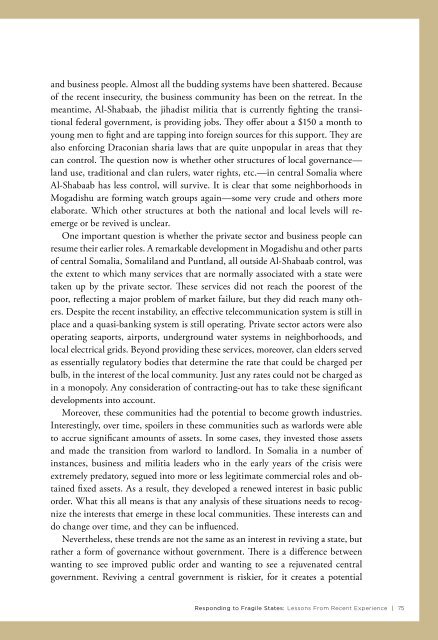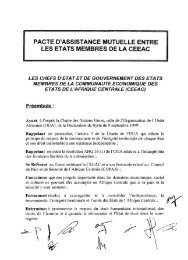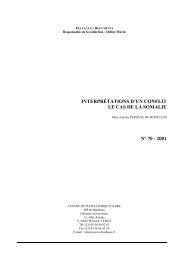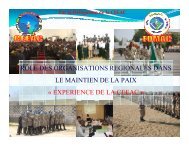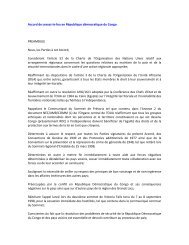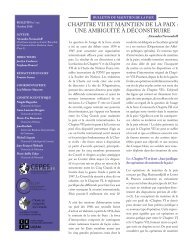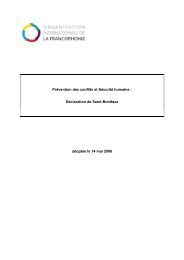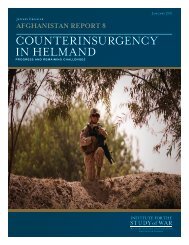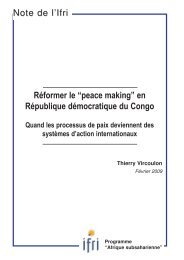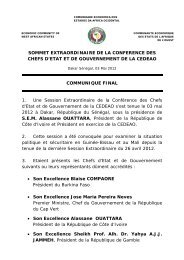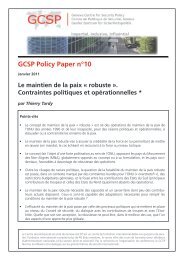engaging fragile states - Woodrow Wilson International Center for ...
engaging fragile states - Woodrow Wilson International Center for ...
engaging fragile states - Woodrow Wilson International Center for ...
You also want an ePaper? Increase the reach of your titles
YUMPU automatically turns print PDFs into web optimized ePapers that Google loves.
and business people. Almost all the budding systems have been shattered. Because<br />
of the recent insecurity, the business community has been on the retreat. In the<br />
meantime, Al-Shabaab, the jihadist militia that is currently fighting the transitional<br />
federal government, is providing jobs. They offer about a $150 a month to<br />
young men to fight and are tapping into <strong>for</strong>eign sources <strong>for</strong> this support. They are<br />
also en<strong>for</strong>cing Draconian sharia laws that are quite unpopular in areas that they<br />
can control. The question now is whether other structures of local governance—<br />
land use, traditional and clan rulers, water rights, etc.—in central Somalia where<br />
Al-Shabaab has less control, will survive. It is clear that some neighborhoods in<br />
Mogadishu are <strong>for</strong>ming watch groups again—some very crude and others more<br />
elaborate. Which other structures at both the national and local levels will reemerge<br />
or be revived is unclear.<br />
One important question is whether the private sector and business people can<br />
resume their earlier roles. A remarkable development in Mogadishu and other parts<br />
of central Somalia, Somaliland and Puntland, all outside Al-Shabaab control, was<br />
the extent to which many services that are normally associated with a state were<br />
taken up by the private sector. These services did not reach the poorest of the<br />
poor, reflecting a major problem of market failure, but they did reach many others.<br />
Despite the recent instability, an effective telecommunication system is still in<br />
place and a quasi-banking system is still operating. Private sector actors were also<br />
operating seaports, airports, underground water systems in neighborhoods, and<br />
local electrical grids. Beyond providing these services, moreover, clan elders served<br />
as essentially regulatory bodies that determine the rate that could be charged per<br />
bulb, in the interest of the local community. Just any rates could not be charged as<br />
in a monopoly. Any consideration of contracting-out has to take these significant<br />
developments into account.<br />
Moreover, these communities had the potential to become growth industries.<br />
Interestingly, over time, spoilers in these communities such as warlords were able<br />
to accrue significant amounts of assets. In some cases, they invested those assets<br />
and made the transition from warlord to landlord. In Somalia in a number of<br />
instances, business and militia leaders who in the early years of the crisis were<br />
extremely predatory, segued into more or less legitimate commercial roles and obtained<br />
fixed assets. As a result, they developed a renewed interest in basic public<br />
order. What this all means is that any analysis of these situations needs to recognize<br />
the interests that emerge in these local communities. These interests can and<br />
do change over time, and they can be influenced.<br />
Nevertheless, these trends are not the same as an interest in reviving a state, but<br />
rather a <strong>for</strong>m of governance without government. There is a difference between<br />
wanting to see improved public order and wanting to see a rejuvenated central<br />
government. Reviving a central government is riskier, <strong>for</strong> it creates a potential<br />
Responding to Fragile States: Lessons From Recent Experience | 75


